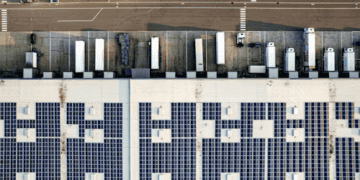November 4, 2024 – (Hanoi) Several prominent Chinese-owned solar factories in Vietnam are scaling back production and laying off workers in response to recent expansions of U.S. trade tariffs affecting Vietnam and three other Southeast Asian nations. This development has prompted some Chinese firms to shift focus towards establishing new manufacturing facilities in Indonesia and Laos, allowing them to avoid these tariffs.
Since 2012, the U.S. has imposed tariffs on solar imports from Southeast Asia, with the latest expansions announced in October following complaints from American manufacturers. The increased tariffs have adversely affected Vietnam’s solar sector, resulting in job losses at factories operated by companies such as Longi Green Energy and Trina Solar. Reports indicate that Longi has cut operations to just one of its nine production lines in Bac Giang province, leading to hundreds of layoffs, while Trina Solar has suspended operations at one of its two factories in Thai Nguyen.
Despite these challenges in Vietnam, Chinese solar manufacturers are actively pursuing new opportunities. They are establishing operations in Indonesia and Laos, with plans to produce a combined capacity of 22.9 gigawatts of solar cells and panels. This new output is expected to supply a significant share of the solar panels installed in the U.S., which continues to be the world’s second-largest solar market.
Trade analysts note that Chinese companies have effectively navigated U.S. tariffs by relocating production while maintaining their stronghold in the global solar market. Currently, China accounts for approximately 80% of global solar shipments, a notable shift from its position two decades ago when the U.S. dominated the industry.
U.S. solar imports have increased significantly, tripling since tariffs were first introduced, with nearly 80% of these imports now coming from countries such as Vietnam, Thailand, Malaysia, and Cambodia, where many factories are Chinese-owned. The average price of solar products in the U.S. remains about 40% higher than in China, complicating the competitive landscape for American manufacturers.
As the U.S. election approaches, tariffs on solar imports continue to be a controversial topic. Former President Donald Trump has advocated for substantial tariffs on all imports to strengthen domestic manufacturing, while Vice President Kamala Harris has warned that such measures could lead to higher costs for American consumers. Nonetheless, both parties in Congress support stronger enforcement of tariffs to protect U.S. industries from what they view as unfair competition.
Discover comprehensive supply chain report news insights at The Supply Chain Report. For international trade resources, visit ADAMftd.com.
#SolarIndustry #TradeTariffs #VietnamEconomy #CleanEnergy #GlobalManufacturing















